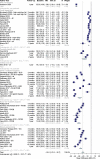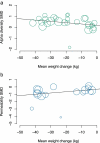The association of weight loss with changes in the gut microbiota diversity, composition, and intestinal permeability: a systematic review and meta-analysis
- PMID: 35040746
- PMCID: PMC8796717
- DOI: 10.1080/19490976.2021.2020068
The association of weight loss with changes in the gut microbiota diversity, composition, and intestinal permeability: a systematic review and meta-analysis
Abstract
The gut microbiome may be a mediator between obesity and health outcomes. However, it is unclear how intentional weight loss changes the gut microbiota and intestinal permeability. We aimed to systematically review and quantify this association. We searched Medline, Embase, CINAHL, Cochrane databases, and trial registries until June 2020 (PROSPERO: CRD42020205292). We included trials of weight loss interventions (energy-restricted diets, pharmacotherapy, bariatric surgery) reporting on the microbiome. Two reviewers independently completed screening, extraction, and risk assessment with the ROBINS-I tool. Pooled standardized mean differences (SMDs) were obtained from random-effects meta-analyses. Forty-seven trials with 1,916 participants (81% female) and a median follow-up of 6 months (range: 2-24) were included. Based on imprecise evidence but with fairly consistent direction of effect, weight loss was associated with a statistically significant increase in α-diversity [SMD: 0.4 (95% CI: 0.2, 0.6], p < .0001, I2 = 70%, n = 30 studies) and a statistically significant reduction in intestinal permeability [SMD: -0.7 (95% CI: -0.9, -0.4), p < .0001, I2 = 83%, n = 17 studies]. Each kg of weight loss was associated with a 0.012 (95% CI: 0.0003, 0.024, p = .045) increase in α-diversity and a -0.017 (95% CI: -0.034, -0.001, p = .038) reduction in intestinal permeability. There was clear evidence of increases in the relative abundance of Akkermansia, but no clear evidence of changes in individual phyla, species, or fecal short-chain fatty acids. Restricting the analyses to the studies with lower risk of bias did not materially alter the estimates. Increasing weight loss is positively associated with increases in gut microbiota α-diversity and reductions in intestinal permeability.
Keywords: Weight loss; diversity; intestinal permeability; meta-analysis; microbiota.
Conflict of interest statement
DAK, SAJ, and PA report being investigators in an investigator-led publicly funded (NIHR) trial where the weight loss intervention was donated by Nestle Health Sciences to the University of Oxford outside the submitted work. SAJ is investigator on an NIHR-funded trial where the weight loss interventions have been provided by Slimming World and Rosemary Conley to the trial participants free of charge. PA spoke at symposium at the Royal College of General Practitioners conference that was funded by Novo Nordisk. SAJ attended a one-day meeting on digital health interventions, organized by Oviva. None of these association led to payments to these authors personally. JRM has received renumeration from Cultech Ltd., and Enterobiotix Ltd., for consultation.
Figures




References
-
- Koutoukidis DA, Koshiaris C, Henry JA, Noreik M, Morris E, Manoharan I, Tudor K, Bodenham E, Dunnigan A, Jebb SA, et al. The effect of the magnitude of weight loss on non-alcoholic fatty liver disease: a systematic review and meta-analysis. Metabolism. 2021;115:154455. doi:10.1016/j.metabol.2020.154455. - DOI - PubMed
-
- Ma C, Avenell A, Bolland M, Hudson J, Stewart F, Robertson C, Sharma P, Fraser C, MacLennan G. Effects of weight loss interventions for adults who are obese on mortality, cardiovascular disease, and cancer: systematic review and meta-analysis. BMJ. 2017;359:j4849. doi:10.1136/bmj.j4849. - DOI - PMC - PubMed
Publication types
MeSH terms
Grants and funding
LinkOut - more resources
Full Text Sources
Medical
